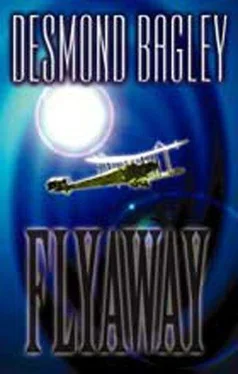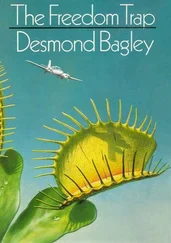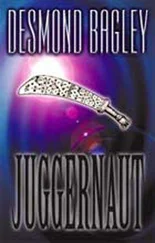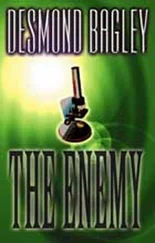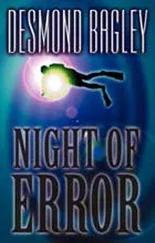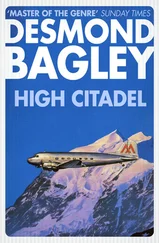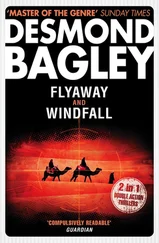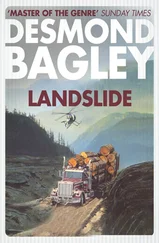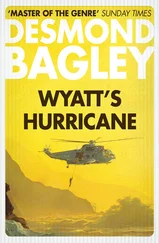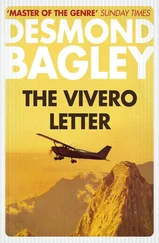Desmond Bagley - Flyaway
Здесь есть возможность читать онлайн «Desmond Bagley - Flyaway» — ознакомительный отрывок электронной книги совершенно бесплатно, а после прочтения отрывка купить полную версию. В некоторых случаях можно слушать аудио, скачать через торрент в формате fb2 и присутствует краткое содержание. Жанр: Прочие приключения, на английском языке. Описание произведения, (предисловие) а так же отзывы посетителей доступны на портале библиотеки ЛибКат.
- Название:Flyaway
- Автор:
- Жанр:
- Год:неизвестен
- ISBN:нет данных
- Рейтинг книги:3 / 5. Голосов: 1
-
Избранное:Добавить в избранное
- Отзывы:
-
Ваша оценка:
- 60
- 1
- 2
- 3
- 4
- 5
Flyaway: краткое содержание, описание и аннотация
Предлагаем к чтению аннотацию, описание, краткое содержание или предисловие (зависит от того, что написал сам автор книги «Flyaway»). Если вы не нашли необходимую информацию о книге — напишите в комментариях, мы постараемся отыскать её.
Flyaway — читать онлайн ознакомительный отрывок
Ниже представлен текст книги, разбитый по страницам. Система сохранения места последней прочитанной страницы, позволяет с удобством читать онлайн бесплатно книгу «Flyaway», без необходимости каждый раз заново искать на чём Вы остановились. Поставьте закладку, и сможете в любой момент перейти на страницу, на которой закончили чтение.
Интервал:
Закладка:
'Waterfall!' I said weakly.
'Sure; the Tassili was well watered at one time. Real big rivers. And it was good cattle country with plenty of feed. Long time ago, of course.'
Of course!
I sipped sweet tea from a small brass cup and regarded Paul, who was lying flat on his back and seemed completely exhausted. He'd made it but only just. I went over to him. 'Have some tea, Paul.'
His chest heaved. 'Later,' he gasped.
'Max!' said Byrne. His voice was soft but there was a snap of command in it. I looked up and he jerked his head so I went and joined him where he stood looking down the ravine.
He pointed to the desert floor and there, two miles away and nearly half a mile below was a movement of sand.
'Dust devils?' They were familiar in the desert; miniature whirlwinds caused by the convection currents stirred up by the heat.
Byrne looked up at the sun. 'Not at this hour. I think we've got company. There are two.'
'How the hell would Lash know we came here?'
Byrne shrugged. 'Anyone going up to the Tassili from Djanet would com e this way. No other way as easy.' Easy! 'He'll have been asking around in Djanet; it would have been no trick to trace us — just a few enquiries at the hotel.'
'We ought to have been more discreet.'
'It wouldn't have worked. No one can hire men and animals in Djanet without the word getting round. Lash's men might speak Tamachek, but even if they have only Arabic they'd have no trouble in finding out what they wanted to know.'
I looked down the cliffside and there was no movement to be seen. 'So we're in trouble.'
'Not too much,' said Byrne unperturbedly. They won't climb up here in the dark, and the sun will set in an hour. I guess they'll wait until tomorrow. That gives us a chance to get lost.' He looked back at Paul. 'We'll give him time to rest up then push on.'
'Where to?'
'Over the rise there — to Tamrit and Assakao.'
Never could I have imagined a landscape such as that of the Tassili n' Ajjer. We walked in the beds of long-gone rivers which, when in flood, had carved deeply into the soft sandstone, making what were now canyons, the walls of which were scalloped into whole series of shallow caves on all sides. When desiccation set in and the water had gone the wind had continued to work on the Tassili, abrading the sandstone for thousands of years and sculpturing the rock into pillars and pinnacles of fantastic shape, some towering two hundred or more feet, others undercut at the base and felled as a woodsman would fell a tree.
The land had a baked appearance like an ill-made pie left too long in the oven and, indeed, the Tassili had been under the furnace of the sun for too long without the amelioration of vegetative cover. The sandstone was blackened and covered with a patina of what Byrne called desert varnish. 'You get dew on the stone some nights,' he said. 'And it draws iron and manganese to the surface. Next day the dew evaporates and the iron and manganese oxidize. Have that happening for a few hundred or thousand years and you get a good coating of varnish.'
As he had said, it was a maze, the canyons that had been water-courses joining, linking and separating. I had the feeling that this had been some sort of delta, the end of a journey for a mighty river, once fast but now slow and heavy with silt like the delta of the Nile. But then it had come to Tamrit and the edge of the Tassili to plunge two thousand feet to the land below, taking the silt to what were now the huge dunes of the Erg d'Admer. And now there was no water. The land was dry as a camel bone found in the Tenere, but not bleached — rather sun-scorched and hardened like a mummified corpse.
That I saw during the first hour before the sun set and then, at Byrne's insistence, we continued, aided by the lamp of a full moon, until nine that night when he relented and we made camp. By this time. Paul was near collapse and I was wearier than I'd been since our stroll through the Tenere. Too tired to eat, I crawled into one of the shallow caves in the rock and fell asleep huddled in my djellaba, I awoke in daylight to find a man looking down at me. He was dark-skinned and wore nothing but a loincloth and, in his right hand, he carried a spear. Behind him was a herd of cattle, healthy-looking beasts with piebald hides and wide-spreading horns. And beyond them was a group of hunters carrying bows, some with arrows nocked to the string.
I blinked in surprise and sat up and stared. The man was nothing but paint on the wall of the cave, and so were the cattle and the hunters. I jerked my head around and saw Byrne squatting outside the cave, feeding the water-boiling contraption he called a volcano. Behind him Hami was loading djerbas on to a donkey.
'Luke,' I said, 'have you seen this?'
He looked up. 'Time you were awake. Sure, I've seen it — one of the Tassili frescoes.'
I turned back to stare at it. The colours seemed as fresh as though it had been painted the week before and there was a fluency and elegance of line in the drawing of the cattle which any modern painter would envy. 'How old is this?'
Byrne came into the cave. 'The cattle? Three thousand years, could be four.' He moved along the wall of the cave until he came to the end. 'This is older — this mouflon.' I scrambled to my feet and joined him. The wild sheep was more crudely executed. 'Eight thousand years,' said Byrne. 'Maybe more, I wouldn't know.'
I began to examine the wall more carefully, looking for more treasures, but he said brusquely, 'No time for that We've a long way to go. Wake Billson.'
Reluctantly I turned away, woke Paul, and then helped to make our breakfast. Not more than half an hour after I had woken we were on our way again, threading the canyons of the Tassili. An hour later I saw the green of trees, big ones lofting more than fifty feet. The branches were wide spread but twisted and gnarled. I said, 'There must be water here,' and pointed. 'Cypress,' said Byrne. 'Those can have a tap root a hundred feet long and going straight down. And they're older than Methuselah; maybe they were here at the time the guy was painting those cattle back there in the cave.'
We left the trees behind and marched in silence and again all was silence except for the clatter of stones and the snorting of the donkeys and an occasional word passing between Atitel and Hami. There wasn't much to say about what we were looking for — everything had been said to exhaustion. And there wasn't much to say about Lash, either. If he was coming up behind he'd either catch us or he wouldn't.
We stopped briefly at midday to eat, and again at sunset, and then pressed on into the moonlit night I thought it unsafe and said so, but Byrne was confident that Atitel knew what he was doing, more confident than I. Again we stopped at about nine and I found another cave. To my surprise I was not as tired as I had expected to be, and Paul was better, too. I looked at him as he unslung a jerrican from a donkey and thought of what Isaacson, back in Luton, had called him. A nebbish! The total nonentity.
It was true! Hours had gone by at a time when, even in Paul's presence, I had not given him a thought. When we drove in the Toyota he always sat in the back and wasn't under my eye. On this, and other, desert marches he always brought up the rear. He said little, never commenting on what he saw, however wondrous, but just stubbornly put one foot in front of the other. And he never complained, no matter how he felt. It was something to say for Paul but, all the same, he might just as well not have been there. The nebbish!
As for Luton — that was a million miles away, on another planet.
We fed on dates and dried mutton and I asked Byrne what progress we were making. He chewed vigorously, then swallowed. 'Not too bad. Atitel reckons on less than a day and a half. He says he'll see a landmark he knows before dark tomorrow.'
Читать дальшеИнтервал:
Закладка:
Похожие книги на «Flyaway»
Представляем Вашему вниманию похожие книги на «Flyaway» списком для выбора. Мы отобрали схожую по названию и смыслу литературу в надежде предоставить читателям больше вариантов отыскать новые, интересные, ещё непрочитанные произведения.
Обсуждение, отзывы о книге «Flyaway» и просто собственные мнения читателей. Оставьте ваши комментарии, напишите, что Вы думаете о произведении, его смысле или главных героях. Укажите что конкретно понравилось, а что нет, и почему Вы так считаете.
